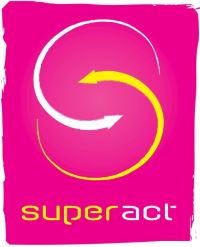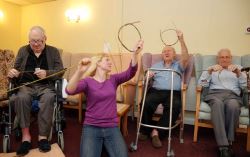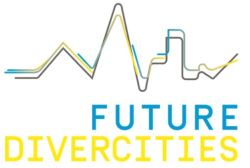Superact uses creativity to improve the lives of vulnerable groups and bring communities together. Based in the U, but working on an international level, Superact was founded as a not-for-profit Community Interest Company in Somerset in 2006 and its headquarters remain in Taunton. Superact continues to run a number of focused art, music and innovation projects to support communities.

Superact was responsible for the successful running of the nationwide project the Bandstand Marathon, which supported musicians in their community and was the main closing event of the London 2012 Olympic Games. Other projects that Superact continues to be involved with include arts-based projects in the UK and across Europe.
In partnership with the University of Exeter, Superact developed the Supporting Employability and Personal Effectiveness (SEPE) qualification providing the organisation with a strong track record of delivering projects that have promoted social inclusion, boost employment opportunities and increase wellbeing through raised self-esteem and confidence in all those they work with.
Projects
Bandstand Marathon
 The Bandstand Marathon began 2008 as part of the cultural events planned in the UK as part of the Cultural Olympiad in the run up to, and including, the Summer 2012 London Olympics. The Bandstand Marathon offered free live music concerts which took place simultaneously at bandstands and other outdoor venues across the UK. It was also the official finale event of the London 2012 Olympic Games, when at the closing ceremony of the Paralympic Games, bands across the country played the Coldplay song “Viva La Vida” simultaneously with the Band’s own performance at London’s Olympic Park.
The Bandstand Marathon began 2008 as part of the cultural events planned in the UK as part of the Cultural Olympiad in the run up to, and including, the Summer 2012 London Olympics. The Bandstand Marathon offered free live music concerts which took place simultaneously at bandstands and other outdoor venues across the UK. It was also the official finale event of the London 2012 Olympic Games, when at the closing ceremony of the Paralympic Games, bands across the country played the Coldplay song “Viva La Vida” simultaneously with the Band’s own performance at London’s Olympic Park.
NetBox
 NetBox is a community led lifelong learning initiative, funded by the European Commission under the Lifelong Learning Programme. The aim of NetBox is to enrich small rural communities so they become more self-sufficient. By researching the needs and skills of individuals in towns across Europe, the project explores how communities can be made more resilient by building new learning partnerships generating online educational resources relevant to local residents and networking so that consumers of educational services can become producers of educational services and content. The initiative, which included Wiveliscombe in Somerset, also promotes inter-cultural awareness within the six pilot communities across Europe by linking them through online social networks.
NetBox is a community led lifelong learning initiative, funded by the European Commission under the Lifelong Learning Programme. The aim of NetBox is to enrich small rural communities so they become more self-sufficient. By researching the needs and skills of individuals in towns across Europe, the project explores how communities can be made more resilient by building new learning partnerships generating online educational resources relevant to local residents and networking so that consumers of educational services can become producers of educational services and content. The initiative, which included Wiveliscombe in Somerset, also promotes inter-cultural awareness within the six pilot communities across Europe by linking them through online social networks.
Wellbeing Tour
 Superact also provides music for hospitals and people living with dementia in the Wellbeing Tour project. The project has been carried out by four European partners from Finland, UK, Austria and Estonia. The partners conducted arts and crafts workshops in their respective countries and provided training for facilitators and other partners. Best practices of facilitating arts and crafts workshops for older people were reflected and developed collaboratively. The results of this collaboration are gathered in the Handmade Wellbeing Handbook.
Superact also provides music for hospitals and people living with dementia in the Wellbeing Tour project. The project has been carried out by four European partners from Finland, UK, Austria and Estonia. The partners conducted arts and crafts workshops in their respective countries and provided training for facilitators and other partners. Best practices of facilitating arts and crafts workshops for older people were reflected and developed collaboratively. The results of this collaboration are gathered in the Handmade Wellbeing Handbook.
Future DiverCities
 Future DiverCities is a 10-partner project across Europe and Canada exploring new media art in response to the urban setting. One example is the teaching of graffiti art to young offenders, but it includes a wide range of activities and workshops that look at creative and innovative ways to build future cities and how that helps urban transformation. Future DiverCities sees creative innovation as helping citizens see things in a different way, which supports the development of stronger communities.
Future DiverCities is a 10-partner project across Europe and Canada exploring new media art in response to the urban setting. One example is the teaching of graffiti art to young offenders, but it includes a wide range of activities and workshops that look at creative and innovative ways to build future cities and how that helps urban transformation. Future DiverCities sees creative innovation as helping citizens see things in a different way, which supports the development of stronger communities.
International Co-operation Through Music
The goal of the IC Music project (International Co-operation Through Music) is to encourage the building of sustainable and long-lasting cross-border co-operation amongst professional “live” music acts from England, Belgium and France, led by eight current music organisations in the three countries. The cultural exchange provides musicians with opportunities to work and perform across Europe. Superact is responsible for offering training to musicians so that they can share their own music in environments that have the potential to be challenging, but the rewards extremely strong, including hospitals and nursing homes.
PEETA
The Personal Effectiveness and Employability Through the Arts (PEETA) project saw partners from across Europe work with prisoners from institutions across Europe: the Netherlands, Italy, Portugal, Austria and Turkey. Artists went into prisons and taught various art forms to prisoners, with the aim to improve their social and communication skills to improve their chances of turning their lives around, with skills to get into work by giving each a sense of responsibility and time and task management skills, skills that employers are looking for. The project led to the awarding of a new BTEC Supporting Employability and Personal Effectiveness (SEPE) qualification which was developed by Superact in conjunction with the University of Exeter in association with awarding body Edexcel. The project has made a valuable contribution to understanding the potential role of arts in prisons and some of the practical considerations to further develop employability initiatives that promote a highly integrated approach.
